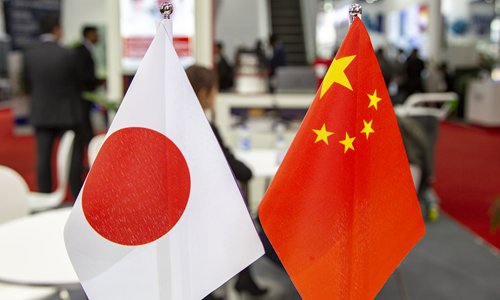HOME >> OPINION
Desperate Japan turns to China
By Jiao Kun Source:Global Times Published: 2019/10/14 20:28:40

Photo: IC
What's behind Japanese Prime Minister Shinzo Abe's newfound enthusiasm of improving ties with China after he recently once again vowed to take relations to a new level? In a policy speech outlining his goals in an extraordinary Diet session convened in early October, Abe said he hoped to open up a new era in Japan-China relations.
The most plausible answer lies in Japan's poor handling of foreign affairs. Although having boasted about his globe-trotting diplomacy for many years, the Japanese prime minister is actually leading his country into a diplomatic deadlock.
Japan currently does not enjoy good relations with any of its neighbors. There have been signs of unease under Abe's leadership and he is acquiring the reputation of a noisy trouble-maker in East Asia and Northeast Asia.
Japan has fallen out with South Korea by excluding the latter out of its whitelist of preferred trade partners in August. Despite a denial by the Japanese government, this move is widely seen as retaliation against a judgment by the South Korean Supreme Court asking Japanese companies to compensate forced laborers they drafted in Korea during the World War II.
Japan's economic coercion triggered national outrage and forced South Korean retaliation. Besides ousting Japan from its own trade whitelist, the most destructive step taken by the South Korean leaders was to terminate GSOMIA, the General Security of Military Information Agreement, which allowed Japan and South Korea to share sensitive military intelligence via the US. The revocation of such a treaty will notably weaken Japan's ability to detect military activities in its surrounding regions, such as launch of projectiles by North Korea. Furthermore, the military alliance in East Asia led by the US, which Japan holds as the cornerstone of its national security policies, will also be shaken.
Japan's recent engagements with North Korea similarly yielded nothing positive. North Korean officials rejected Abe's proposal to negotiate without preconditions and termed the offer "brazen-faced." The passive reaction from North Korea can be justified by Abe's duplicity: He had shown the willingness to discuss issues such as kidnapping of Japanese citizens and denuclearization with North Korean leaders while claiming to set no preconditions. As US President Donald Trump strives to mend fences with North Korea, Japan is acting like a recluse and shutting itself out of the historic trajectory toward regional peace in Northeast Asia.
Relations with Russia are apparently deteriorating. A maiden tour to the Southern Kuril Islands, or the Northern Territories as called in Japan, for Japanese tourists scheduled for October 11-16 has been postponed indefinitely. After multiple personal meetings with President Putin, Abe seems to be losing direction to a peace treaty with Russia and the return of at least half of the Southern Kuril Islands. Even the originally planned joint economic activities on the islands have been stalled because of differences over which country's laws should apply. The main reason for this impasse is Japan's clinging to the military alliance with the US, which makes Russia squirm.
Even the US is becoming part of the problem. Under pressure from the Trump administration, the US and Japan have agreed an initial trade deal in late September, under which Japan is to cut tariffs on American agricultural products, while the US makes no promise of giving Japanese cars and auto-parts the same treatment.
Given the history of US-Japan trade negotiations and Trump's stance on trade policies, Tokyo is highly likely to take severe hits from this deal called a "win-win" by Abe.
So, China now turns to be the last hope for Abe to gain some points. He is apparently willing to make those points; the problem is whether by lip service or by substantial measures. Up until now, Japan has not done much to corroborate its words. If the kindness is shown only to assure President Xi Jinping's visit to Japan in the coming year, which would serve as a major diplomatic event before Abe steps down, Japan will finally find itself in a situation that doesn't have a way out.
The author is a lecturer at the School of History, Wuhan University. opinion@globaltimes.com.cn
Posted in: ASIAN REVIEW